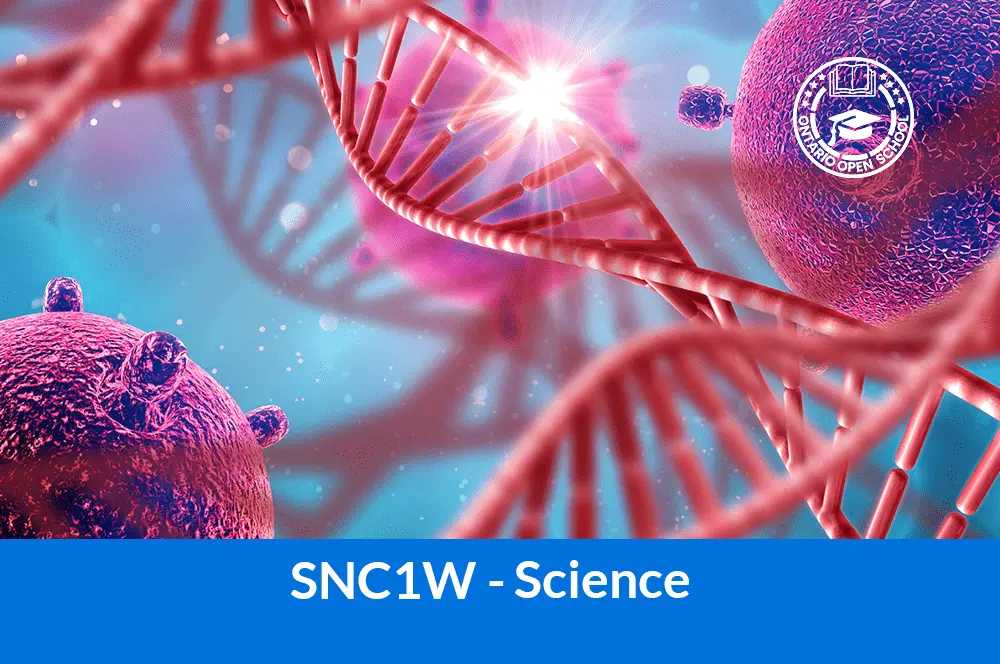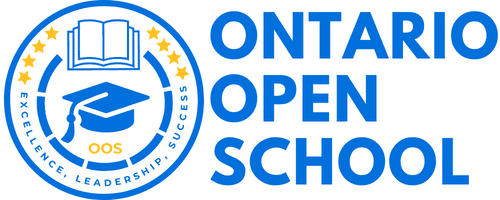- info@ontarioopenschool.com
- 647-494-4499
-
Unit 100 - 29 Gervais Drive, North York, ON.
M3C 1Y9
Copyright 2024 Ontario Open School Inc. All Rights Reserved.
This course enables students to develop their understanding of concepts related to biology, chemistry, physics, and Earth and space science, and to relate science to technology, society, and the environment. Throughout the course, students will develop and refine their STEM skills as they use scientific research, scientific experimentation, and engineering design processes to investigate concepts and apply their knowledge in situations that are relevant to their lives and communities. Students will continue to develop transferable skills as they become scientifically literate global citizens.
Unit Order | Unit Name | Suggested Time |
|---|---|---|
| Unit 1 | Biology : | 20 hours |
| Unit 2 | Chemistry : | 20 hours |
| Unit 3 | Physics : | 20 hours |
| Unit 4 | Earth and Space : | 20 hours |
| Unit 5 | STEM Skills and Careers : | 20 hours |
| Culminating Assignments and Exam | This consists of a midterm assignment, a final culminating assignment as well as a final exam. | 10 hours |
| Total | 110 hours |
A variety of strategies are used to allow students many opportunities to attain the necessary skills for success in this course. The teacher uses a variety of whole class, small group and individual activities to facilitate learning. The following is a list of specific teaching/learning strategies that the teacher may use but is not limited to:
|
In – class discussion Problem solving Group discussion Peer partner learning Interviewing In – class practice Concept formation Inquiry |
Structured overview Lecture Explicit teaching Compare and contrast Demonstrations Real life examples connection (STSE) |
Reflective discussion Guided thinking Problem posing Internet research Homework Assigned questions Computer Assisted Instruction Laboratory Simulations |
Purpose
The primary purpose of assessment is to improve student learning. Assessment relates directly to the expectations for the course.
A variety of assessments for and as learning are conducted on a regular basis to allow ample opportunities for students to improve and ultimately demonstrate their full range of learning and for the teacher to gather information to provide feedback. Assessment tasks relate to the success criteria set out in lesson plans. Success criteria allow students to see what quality looks like.
Evaluation is the process of judging the quality of student work in relation to the achievement chart categories and criteria and assigning a percentage grade to represent that quality. Evaluation is based on gathering evidence of student achievement through:
Assessment for Learning – we provide feedback and coaching. Assessment FOR Learning is the process of seeking and interpreting evidence for the use of learners and their teachers to decide where the learners are in their learning, where they need to go, and how best to go there.
Assessment as Learning – we help students monitor progress, set goals, reflect on their learning
Assessment AS Learning is the process of the explicit fostering of students’ capacity over time to be their own best assessors, but teachers need to start by presenting and modeling external, structured opportunities for students to assess themselves.
Assessment of Learning – we use assessments to provide evaluative statements about student achievement. Assessment OF Learning is the assessment that becomes public and results in statements of symbols
(marks/grades/levels of achievement) about how well students are learning. It often contributes to pivotal decisions that will affect students’ future.
A wide variety of instructional strategies are used to provide learning opportunities to accommodate a variety of learning styles, interests and ability levels. These strategies include:
ASSESSMENT TOOLS
| Assessment and Evaluation
Evaluation in this course will be continuous throughout the year and include various evaluation methods. The tools highlighted will be used for the three different types of assessments: |
||
| Assessment as Learning | Assessment for Learning | Assessment of Learning |
| Student Product:
Learning Logs (anecdotal) Checklist (Units) Self – evaluation sheet |
Student Product:
Pre – tests (scale/rubric) Quizzes (scale/rubric) Homework Peer feedback (anecdotal/checklist) Vocabulary notebooks (anecdotal) |
Student Product:
Assignments Tests (scale/rubric) Lab Reports (rubric/checklist) Final Examination
|
| Observation:
Whole class discussions (anecdotal) Review of Lab Design/Report Review of Research Notes |
Observation:
Class discussions (anecdotal) Performance tasks (anecdotal/scale) |
Observation:
Performance tasks (anecdotal/scale) PowerPoint presentations (rubric) |
| Conversation:
Student teacher conferences (checklist) Small group discussions Pair work (checklist) |
Conversation:
Student teacher conferences (checklist) Small group discussions (checklist) Peer – feedback (anecdotal) |
Conversation:
Question and answer session (checklist) |
Resources
Growing Success: Assessment, Evaluation and Reporting in Ontario Schools (2010)
http://www.edu.gov.on.ca/eng/policyfunding/growSuccess.pdf
McGraw-Hill Ryerson ON Science 9 ©2009 (T. Dickinson, L. Edwards, E. Grace, C. Jackson, M. Mazza & J. Rose)
The Final Grade and Report Card
Grading
Weighting of categories
| Achievement chart category | |||||||||
| The categories, defined by clear criteria, represent four broad areas of knowledge and skills within which the expectations for any given science course are organized. The four categories should be considered as interrelated, reflecting the wholeness and interconnectedness of learning.
The categories of knowledge and skills are described as follows:
|
|||||||||
|
|||||||||

Course Grade | Grade 9 |
|---|---|
Course Code | SNC1W |
Course Category | Science |
Course Type | De-Streamed |
Course Delivery | Online |
Course Duration | 8hrs |
Course Credit | 0 |
Copyright 2024 Ontario Open School Inc. All Rights Reserved.
